Pastors of Seven Springs Chapel and Seven Springs Church
Rev. H.M. White, DD. (1866-1975)
“In 1866 January 1st REV. H. M. WHITE, DD, whose presence added so much to the importance, dignity and enjoyment of this occasion, entered upon his labors as pastor of this church and continued in charge until May 16, 1875, when he resigned to accept a call to the Loudoun Street Church, Winchester, Va., where he is still the efficient and beloved pastor. The presence of such a man was greatly needed at Glade Spring when Dr. White came. It was just after the war and the congregation was greatly demoralized. For a long time the church had no regular pastor and the religious status of the congregation was unstable and doubtful. Many persons in the community seemed to value their broad acres and fine cattle more than they counted the privileges of the sanctuary. Others were simply careless and indifferent by reason of spiritual neglect. To meet this emergency the right man was found, and the fruits of his labors may be in part summarized as follows:
- He inaugurated systematic business methods in church work. The Session held more meetings in the first four years of Dr. White’s pastorate than were held altogether in the thirty years preceding the beginning of his pastorate. The Session ceased to be a mere figure head and became a vital governing force exercising at the proper time much needed discipline over church The treasurer was required to make a full report of all funds received and disbursed, and that report was to be audited by the Session. Collections began to be taken regularly every Sabbath and God’s people were given an opportunity to contribute to the various objects of beneficence. In fact every department of church work was systematized and enlarged
- The second great improvement is the prominence given to the deacons of the church. The Records of Session mention the existence of deacons for the first time under Dr. White’s As soon as they are given the place of prominence and usefulness which the word of God assigns them, the gospel seemed to increase in power. The number of the disciples was greatly multiplied, and many became obedient to the faith, as they did in apostolic times, when the first deacons were elected and sent forth.
- It was during Dr. White’s ministry that the Manse property was purchased and the Manse built on its present site. This was a long step in the right direction and has contributed much to the stability of the congregation by avoiding frequent change of pastor.
- On October 18, 1873, the centenary of this church was celebrated with appropriate ceremonies and was of great interest and value. Dr. B. M. .Smith of Union Seminary in Va. made a speech of one hour and forty-five minutes in length, and strange to say the interest of the congregation never flagged. This celebration stimulated Dr. White to gather up and put in permanent form some history that is invaluable to this church which might otherwise have been An account of the centenary as given by Dr. White may be found in the Records of the Session.
- Work at Seven Springs was begun. No part of the church’s work has been more fruitful than
- The benevolent side of the congregation was greatly developed during his pastorate and 116 persons were received into the communion of the church by letter and on profession of faith.
Rev. J. O. Sullivan (1875-1885)
In a few months after Dr. White moved to Winchester the congregation made out a call to REV. J. 0. SULLIVAN, then pastor of the Church at Helena, Arkansas. This call is dated November 7, 1875, and is signed by J. C. Porterfield, P. B. Snapp, J. W. Benham, Robert Clark, A. D. Hutton, E. A. Robinson, and W. Beanie. He entered upon his labors January 1, 1876 and remained nine years. Mr. Sullivan is a person of good natural gifts which have been cultivated mainly in the saddle. He is not a systematic student nor a lover of books, but it is said he often preaches fine sermons and at times becomes eloquent. His bodily presence is neither weak nor contemptible. He possesses a fine physique and great physical endurance, he is full of fire and when he becomes enamored of an idea, it grows into a sermon which he delivers from the shoulder, regardless of logical consequence and this is done with a voice of great force and compass. Few sleep under his preaching. He was about 40 years of age and exceedingly active when he began work here, and he carried forward the interest of Zion with zeal and vigor, and maintained well the standard set-by his predecessor. Let-it-be further observed 1st. – That the Meadowview Church was sent out as a colony from Glade Spring Church about the close of his ministry-2nd That 113 persons united with the church by letter on profession of faith during the term of his service.
Rev. Mr. Sullivan resigned his charge here to accept the Presidency of Stonewall Jackson Institute at Abingdon, Va.
Rev. Frank McCutchan (1885-1891)
Rev. Frank McCutchen to whom a call was extended February 22, 1885 ,while he was preaching at Waynesboro. Va. He accepted the call and commenced his ministry here on the 1st Sabbath of April 1885, and was installed pastor May 2, 1885, by Rev. U. McClure and Rev. J. 0. Sullivan. The congregation soon discovered that their new pastor was a man of power. At the time of his coming here he was about 40 years old, had black hair and a clean-shaven face, his personal appearance is striking, he possesses keen penetrating dark eyes, and broad forehead and mouth with like compressed, and a jaw of iron. His whole expression indicates ability with predominating will-power. In conversation there is notable twitching of the upper lip, tightening it across his teeth of spotless white, and this is especially observed when he is speaking, as it were ex cathedra, or from a slight irritation of temper. He is admirably equipped for the ministry, being scholarly and of a literary type of mind, and his preaching is marked by freshness and vigor. Being a fine student, his preaching is characterized by great uniformity of excellence. This is due in a measure to his uniformly good health. His sermons are not like a mountain range with here and there a lofty peak, but like a long chain of mountain peaks, each high enough to excite our admiration and elicit our favorable comment. This strong man seems to have been providentially sent here to build an additional house of worship in the village of Glade Spring. In the face of considerable opposition and much prejudice that work was done and well done, and then Rev. Frank McCutchan accepted a call to Rogersville, Tennessee, and is still the pastor of that church. His
work will be more highly appreciated by the next generation than by the present. During the term of his labors here, he received into the communion of the church 67 persons on examination and by letter. Rev. Frank McCutchan resigned November 1891, and the church was vacant for a year.
Rev. P.H. Gwinn (1892-1901)
October 23, 1892, REV. P. H. GWINN was called to the pastoral charge of this congregation. He was then preaching the gospel to a group of churches in Albemarle County, VA. The call was signed by the following persons J. A. Buchanan, J. C. Porterfield, George A. C. Beanie, A. H. Byars, W. B. Ernest, J. R. Robinson, T. M. Porterfield. He took charge of the work in December 1892, and has continued to the present. During this period of five years 94 persons have been received into the church, chiefly on profession of faith, and more than eight thousand contributed to all objects of church work, making an average of more than sixteen hundred dollars per annum. The congregation owns two excellent houses of worship, built of brick and in first-rate repair, good manse property, and some money and is entirely free of debt. A list of elders whose names have been given to us is as follows: Mitchell Robinson, David Beanie, John Eakin, Peter Clark, James I. Clark, Arthur Hutton, John Robinson, Philip Snapp, J. C. Porterfield, I. M. Benham, Win. B. Dickenson, James A. Buchanan, Dr. A. D. Hutton, A. H. Byars, George A. C. Beanie and Walter Robinson. The Session is composed at this time of J. A. Buchanan, George A. C. Beanie, A. H. Byars and M. Walter Robinson. The following is a list of the Deacons: Robert Clark, A. D. Hutton, J. D. Hutton, J. C. Watson, Win. B. Ernest, A. H. Byars, M. V. Edmondson, R. E. Dunn, L. Porterfield, C. 0. Snapp, T. M. Porterfield, J. D. Kent, and A. M. Byars. The diaconate now consists of C. 0. Snapp, T. M. Porterfield, J. D. Kent, and A. M. C. Byars. Those who acted in the capacity of Trustees are the following: Robert Buchanan, Joseph Snodgrass, David Beanie, John Porterfield, Thomas Edmiston, Win. Beanie, James Scott, David Edmiston, Leonard Hutton, Win. Eakin, R. B. Edmondson, T. B. Porterfield, E. A. Robinson, Jno. H. Ernest. W. C. Edmondson, W. Beanie, Robert Henderson, Dr. A. D. Hutton, Robert Clark, J. C. Porterfield, J. D. Hall (not confirmed by court) A. H. Byars, J. T. Buchanan, Joseph Hutton, G. A. C. Beanie, C. 0. Snapp, E. J. Hutton, T. M. Porterfield and John R. Robinson.
(This ends Rev. Gwinn ‘s 1897 “Brief History of the Glade Spring Church’)
Rev. Gwinn continued as pastor until November 1901. During the latter part of his pastorate, the three chapels .Seven Springs, Ebbing Spring, and Fleet were built.
Mr. Gwinn was considered to be an exceptionally good pastor since he had a personality fitted for visiting the people and ministering to their needs in an understanding way. He promoted well the Sunday School program started by Rev. Henry M. White.
Rev. John R. Herndon (1902-1907)
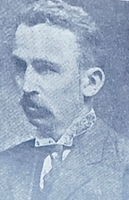 REV. JOHN R. HERNDON became the pastor in 1902. His family consisted of himself, his wife and daughters, Sarah and Margaret. He came to Glade Spring from the First Presbyterian Church in Johnson City, Tenn. His wife was the former Miss Sue Wood of Johnson City, and aunt of the well-known author, Catherine Marshall. He was 40 years old at that time.
REV. JOHN R. HERNDON became the pastor in 1902. His family consisted of himself, his wife and daughters, Sarah and Margaret. He came to Glade Spring from the First Presbyterian Church in Johnson City, Tenn. His wife was the former Miss Sue Wood of Johnson City, and aunt of the well-known author, Catherine Marshall. He was 40 years old at that time.
Mr. Herndon was a student of the Bible. One of his best works was a commentary on the Epistle to the Hebrews. He had a beautiful tenor voice and frequently delighted the congregation with a solo. Not only could he sing, but when the regular organist was absent, he came down out of the pulpit and played the organ for the service. He was stated Clerk of Abingdon Presbytery.
He resigned in July 1907 to become the Associate Editor of The Christian Observer. After a period of years he again accepted pastoral work. He had been serving a church in Winston-Salem, N.C., for a little over a year when he was killed in an automobile accident December 22. 1920. It is reported that 29 preachers attended his funeral service. He was interred in Johnson City, Tenn. A number of the Glade Spring members attended.
Rev. G. W. Nickell (1908-1917)
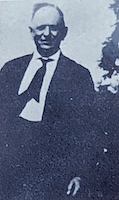 REV. G. W. NICKELL, along with his wife and only son, Paul, came to this church from Marlinton, West Va., in February 1908. Mr. Nickell made profitable use of the seventeen acres of land adjacent to the Manse and well he did, for the salary of the pastor at that time was very small.
REV. G. W. NICKELL, along with his wife and only son, Paul, came to this church from Marlinton, West Va., in February 1908. Mr. Nickell made profitable use of the seventeen acres of land adjacent to the Manse and well he did, for the salary of the pastor at that time was very small.
Evangelism probably was the strongest characteristic of his stay here. The church membership grew noticeably during the nine years he was here. He accepted a call to Clover, S. C., in 1917. Paul Nickell graduated at nearby Emory & Henry College, and U. T. S. in Richmond, Va., as well as completed graduate studies at Princeton University. He served churches in Abingdon Presbytery.
Rev. C.R. Lacy (1918-1928)
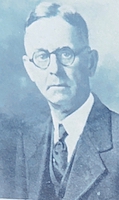 REV. C. R. LACY, his wife, Sally, and two children, Sarah and Clarence came to occupy the Manse early in September 1918. They came from Lexington Presbytery. He was the first pastor to own a car. Two other children, Matthew and Wilson, were born here. A foster daughter, Beulah Overstreet, also grew up in the home.
REV. C. R. LACY, his wife, Sally, and two children, Sarah and Clarence came to occupy the Manse early in September 1918. They came from Lexington Presbytery. He was the first pastor to own a car. Two other children, Matthew and Wilson, were born here. A foster daughter, Beulah Overstreet, also grew up in the home.
Mr. Lacy was the son of a Presbyterian minister. His sermons were masterpieces of theology. Evangelism was his chief emphasis. Persistent visiting helped promote his work. He was a gifted Presbyter and served as Moderator of Abingdon Presbytery in 1920, elected Stated Clerk in 1921, Permanent Clerk of Synod of Appalachia in 1923, Temporary Clerk of the General Assembly in 1924. In 1925, he was elected Stated Clerk and Treasurer of the Synod and in
1926, was re-elected Stated Clerk Stated Clerk of Presbytery. In August 1922, the 150th Anniversary was celebrated. During his pastorate the Woman’s Auxiliary came into being and he guided the women’s societies into a smooth transition. He adapted the Constitution to the local organization. He resigned to accept a call to Cook’s Creek in Lexington Presbytery in November 1928.
Rev. David Barclay Walthall (1929-1938)
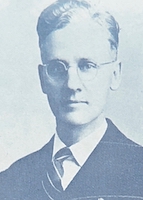 David Barclay Walthall The youthful and youthful-looking David Barclay Walthall, whose father was also a Presbyterian minister, became pastor of the church after completing his seminary work at U.T.S. in the spring of 1929.
David Barclay Walthall The youthful and youthful-looking David Barclay Walthall, whose father was also a Presbyterian minister, became pastor of the church after completing his seminary work at U.T.S. in the spring of 1929.
At that time, the average age of a Session member was more than 65. Mr. Walthall lived alone at the Manse for a number of months, taking his meals in certain homes of the congregation. He married Miss Lois Claytor of North Carolina.
These were happy years marked by changes and steady growth. The Rotary System for deacons was adopted in the mid 301S.
The first Sunday School building was erected at Old Glade. Youth work and Church Extension were emphasized. Warm fraternal relationships were fostered among the several denominations. A new Chapel was built at McCall’s Gap. A director of Young People’s Work was engaged. The Synod of Appalachia met here during his pastorate. In 1938 the Walthall’s (two children born here were Patsy and David) took up work in their new field .the New Providence Church in Lexington Presbytery.
Rev. Howard M. Willson (1939-1942)
Rev. Howard M. Wilson was no stranger to us when he took up his duties as pastor in 1939, for he was known first in the Home Mission work of Buchanan County and more recently as pastor of the Rural Retreat and Seven Mile Ford Churches. He and his family (wife and four children), had occupied the Manse about a year when it was completely destroyed by fire. The Wilsons set up housekeeping in the Sunday School building at Old Glade during the remainder of his stay here. His main contribution to the church, and to the community, was the securing of the services of Dr. J. M. Rogers as a physician-surgeon, and Julia Bradley as Bible Teacher in the public schools. Both were evacuated missionaries.
Youth work was developed and men’s work grew. A Men’s Bible Class was organized in the Town Church and is known as the Wilson Bible Class. As a result of the formation of this class, rooms for the two adult Bible classes were built at the Town Church. In the fall of 1942, Mr. Wilson resigned to enlist as a Chaplain in the U. S. Army. His family resided in Glade Spring in a home he bought for them until he was separated from military service. Shortly thereafter, he accepted a call to the Tinkling Spring Church in Lexington Presbytery.
Rev H.G. Allen (1943-1950)
 Rev. H. G. Allen began his ministry here August 1, 1943. His family consisted of his wife, the former Miss Elizabeth Robinson of Max Meadows, Va., their two children, Betsy and Guthrie. They were the first residents of the lovely brick Manse built on land purchased from Mr. E. B. Clark to replace the one destroyed by fire. Messrs. Claude and Ray Clark built this house. It has many features suitable for a preacher’s family. A special feature is the pastor’s study with a private entrance.
Rev. H. G. Allen began his ministry here August 1, 1943. His family consisted of his wife, the former Miss Elizabeth Robinson of Max Meadows, Va., their two children, Betsy and Guthrie. They were the first residents of the lovely brick Manse built on land purchased from Mr. E. B. Clark to replace the one destroyed by fire. Messrs. Claude and Ray Clark built this house. It has many features suitable for a preacher’s family. A special feature is the pastor’s study with a private entrance.
One of the first helpful programs inaugurated was the formation of the Church Council, which helped co-ordinate the various church organizations. Later, the Defense Service Council was set up to keep in touch with, and to honor the many service men and women from our church.
The Lord’s Acre Plan was adopted to help assemble funds for a Sunday School building at the Town Church. Prayer meeting was held regularly. Emphasis was put on the Children’s Home support. The men of the church raised cattle and slaughtered them for beef for these children. Land adjacent to the new Manse was purchased and a flock of sheep was purchased to graze there-on. A Boy Scout Troop was sponsored. The 175th Anniversary Celebration took place in August 1947. Mr. Allen accepted a call to Cook’s Creek Church and moved to that field in May 1950.
Rev. Dr. Ben F. Brown (1950-1957)
 Ben F. Brown became the pastor in November 1950. He came to us from the Rock Field Church, Wallace, N. C. At that time the family was three .the pastor, his wife, and wee baby daughter, Joy. In 1952, twins .a boy, Benji and a girl, Em , joined the family group.
Ben F. Brown became the pastor in November 1950. He came to us from the Rock Field Church, Wallace, N. C. At that time the family was three .the pastor, his wife, and wee baby daughter, Joy. In 1952, twins .a boy, Benji and a girl, Em , joined the family group.
During the vacation periods of 1951 and 1952, Dr. Brown attended U. T. S. for additional courses for an earned degree. Students from the Seminary were engaged to carry on the local work during these absences.
In 1954, the Town Church was done over and refurbished with funds from the Dunn Legacy. The Vance Company and Mr. E. L. Lovem were the contractors for the work. Appropriate dedicatory services were held in September 1954, upon the completion of the work. The following summer the building at Old Glade was likewise done over. Necessary repairs were made and re-decorations were done. The entrance to the sanctuary was built and dedicated in memory of the Porterfields, children of Mr. James Clark Porterfield. A formal organization of the Men of the Church took place while Dr. Brown was here. He held a number of successful evangelistic meetings locally and elsewhere during these years. He resigned in January 1957, to accept a call to the Alamance Church near Greensboro, N.C.
Rev. William F. Shouse (1957-1965)
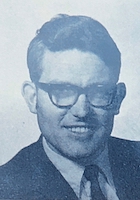 Rev. William F. Shouse, a senior at Columbia Seminary, Decatur, Ga., along with his wife, Sarah, visited the field in March 1957. Mr. Malcolm Doubles, a student at Union Theological Seminary, had been engaged to supply the pulpit during the summer. He and Mrs. Doubles came in June, living first at the Blakemore’s and later at the R. I. Craig’s. Mr. Shouse accepted the call tendered him, arriving July 1. Ordination and Installation Services were held on July 25.
Rev. William F. Shouse, a senior at Columbia Seminary, Decatur, Ga., along with his wife, Sarah, visited the field in March 1957. Mr. Malcolm Doubles, a student at Union Theological Seminary, had been engaged to supply the pulpit during the summer. He and Mrs. Doubles came in June, living first at the Blakemore’s and later at the R. I. Craig’s. Mr. Shouse accepted the call tendered him, arriving July 1. Ordination and Installation Services were held on July 25.
There were challenges and heavy responsibilities confronting the new minister. Along with these were privileges and high hopes. Demands upon the pastor grew until it was evident that a secretary should be employed to get out the bulletins, take care of the minister’s correspondence and records, as well as help with such typing as called for in his respective Presbytery duties. An office was set up in the Town Church and the Ladies’ Bible Class room became the pastor’s study.
Youth work became very active and programs for all age groups were mapped out and followed. The Covenant Life Curriculum, was inaugurated in the Sunday Schools. The Rotary System for the Session was adopted in 1964. Facilities at all the Chapels were improved. Evangelistic meetings were conducted regularly at the different churches in the field. The pastor served in the V.B.S.’s, the camps and conferences, and in every phase of pastoral work
Pressures began to mount. It was evident that sooner or later the work of this sprawling field would need to be more centrally positioned. Much thought was given to the matter.
In August 1965, Rev. Shouse asked to be released to accept a call to Fayetteville, Tn.
He and Mrs. Shouse, and their three little ones, David. Amy and Anne .who were born during his sojourn here, moved to their new home where he is still the pastor.
At this point, it might be well to explain that it had become increasingly difficult to interest anyone in accepting a call to this field because of the seemingly enormous load of five preaching points. In the beginning of the chapel program here, worship services were held three Sunday mornings at Old Glade. The fourth and fifth Sunday morning and the second Sunday night, preaching was in town. Sunday Schools in the other chapels were in the afternoon, except in the winters prior to hard-surfaced roads. At least once a month, the pastor preached at the chapels following the Sunday School hour. People wanted a change asking for Sunday School to meet Sunday morning. During Rev. H. G. Allen’s pastorate, worship services were conducted more often in the chapels before the Sunday School hour or at night. Mr. Sam Smith, a Seminary student, was engaged to assume some of the duties at Seven Springs and McCall’s Gap while Rev. W. F. Shouse was here. Mr. Ken Davis, also a Seminary student, succeeded him, following the same plan. However, the people of these congregations wanted the services of the regular pastor more often than these were available.
Rev. James E. Drinkard (1966-1967)
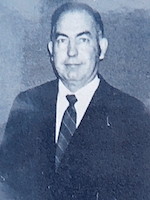 This was when Rev. James F. Drinkard, of Woodstock, Va., came to us with his family of seven, Mrs. Mary Drinkard, and their six children. They moved into a freshly repaired and redecorated manse, and he preached his first sermon April 3, 1966. The Installation Service was May 1,1966. He fell heir to many privileges, duties, responsibilities, as well as woes. Four committees were set up to assist the pastor in planning and executing the work of the various departments of the church. These continue to function. Others have been added. A complete visitation was undertaken first thing in order to become acquainted with the entire membership. Mr. Robert Bryan succeeded Mr. Ken Davis in working with the chapels. Because of continued unrest over the future of the chapel work, Seven Springs, with the consent of the Session, requested Abingdon Presbytery to permit them to organize as a separate church with McCall’s Gap as her chapel. At a meeting of Presbytery in Coeburn, Va., in July, 1967, a commission was named to organize this church group. Many members thus were lost to the parent church. Next, the Town Church followed the same pattern, and in 1969, the Grace Presbyterian Church became another new and separate organization. More than 100 members were transferred to this new group. Ebbing Spring was absorbed, or merged with those left at Old Glade.”
This was when Rev. James F. Drinkard, of Woodstock, Va., came to us with his family of seven, Mrs. Mary Drinkard, and their six children. They moved into a freshly repaired and redecorated manse, and he preached his first sermon April 3, 1966. The Installation Service was May 1,1966. He fell heir to many privileges, duties, responsibilities, as well as woes. Four committees were set up to assist the pastor in planning and executing the work of the various departments of the church. These continue to function. Others have been added. A complete visitation was undertaken first thing in order to become acquainted with the entire membership. Mr. Robert Bryan succeeded Mr. Ken Davis in working with the chapels. Because of continued unrest over the future of the chapel work, Seven Springs, with the consent of the Session, requested Abingdon Presbytery to permit them to organize as a separate church with McCall’s Gap as her chapel. At a meeting of Presbytery in Coeburn, Va., in July, 1967, a commission was named to organize this church group. Many members thus were lost to the parent church. Next, the Town Church followed the same pattern, and in 1969, the Grace Presbyterian Church became another new and separate organization. More than 100 members were transferred to this new group. Ebbing Spring was absorbed, or merged with those left at Old Glade.”
Rev. Richard Stone (1967-1972)
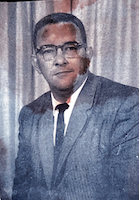 Rev Richard Stone, a recent graduate of Columbia Theological Seminary, accepted a call to pastor Seven Mile Ford Presbyterian Church in August of 1967. Pastor Stone also accepted a call to the work at Seven Springs Church/McCall’s Gap Chapel. His installation service was held for Seven Springs Church on September 10, 1967. Pastor Stone was married, however, they had no children. During his time as pastor, he and his wife adopted two young brothers.
Rev Richard Stone, a recent graduate of Columbia Theological Seminary, accepted a call to pastor Seven Mile Ford Presbyterian Church in August of 1967. Pastor Stone also accepted a call to the work at Seven Springs Church/McCall’s Gap Chapel. His installation service was held for Seven Springs Church on September 10, 1967. Pastor Stone was married, however, they had no children. During his time as pastor, he and his wife adopted two young brothers.
Weekly Bible study was initiated very soon in his pastoral work with alternating Wednesday Night Bible Study between Seven Springs Church and McCall’s Gap Chapel. In the Seven Springs Church congregation, the Bible study grew to be a weekly event, meeting in member homes for study.
Mr. and Mrs. Stone lived in the Seven Mile Ford’s manse. During Pastor Stone’s ministry interest in the work of the Children’s Home in Wytheville, Virginia increased. The congregation raised money to support the Home. The congregation made several visits to the Children’s Home to have picnics and play games with the children of the Home. The interest in the Children’s Home led pastor Stone and his wife to accept a call to be the Administrator of the Children’s Home in Wytheville in the spring of 1972,
Rev. Thomas B. Sullivan, Jr (1973-2018)
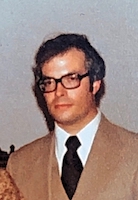 On December 10, 1972, the Session minutes indicate that a discussion was held that the church at Seven Springs might wish to call Thomas Sullivan to be its pastor. The congregational meeting was held in March 1973 and it was decided to send a letter to Thomas Sullivan to inquire if he would consider a call to the work at Seven Springs. His response in April of 1973 was in the affirmative. Pastor Sullivan was ordained and installed as Pastor on June 15, 1973. Pastor Sullivan married Hope Vaughan on July 6, 1974, and their son, Joshua, was born in December 1978.
On December 10, 1972, the Session minutes indicate that a discussion was held that the church at Seven Springs might wish to call Thomas Sullivan to be its pastor. The congregational meeting was held in March 1973 and it was decided to send a letter to Thomas Sullivan to inquire if he would consider a call to the work at Seven Springs. His response in April of 1973 was in the affirmative. Pastor Sullivan was ordained and installed as Pastor on June 15, 1973. Pastor Sullivan married Hope Vaughan on July 6, 1974, and their son, Joshua, was born in December 1978.
Pastor Sullivan from the very onset of his ministry had a desire to follow God’s word in all avenues of the church’s life. Worship services were increased in order that all three preaching points would have a worship service every Lord’s Day.
Pastor Sullivan was the first pastor to begin informing the congregation of what was taking place in the presbytery, and at the General Assembly level of the Presbyterian Church in the United States (PCUS). He informed the church that liberalism had slipped in and was growing.
A greater awe of God and God’s word was an effect of his ministry. The effect of Biblical teaching, preaching, the growing knowledge of the unbiblical beliefs that had invaded the PCUS, and the growing knowledge that the PCUS desired to unite to the Northern Presbyterian (a more liberal organization than the PCUS) brought alarm and awakening to the Pastor and to the congregation of Seven Springs Church. Pastor Sullivan was there to assist when the congregation at Seven Springs Church, withdrew from the PCUS and joined to the Presbyterian Church in America(PCA).
In January of 1990, pastor Sullivan began training to become a certified biblical counselor with NANC-National Association of Nouthetic Counselors. Since completing the necessary course work and supervised on-the-job training, Pastor Sullivan has had many opportunities to use his gifts in the area of biblical counseling both within the congregation and without. He has also worked with the congregation on becoming better counselors since often the members find themselves in situations where they work or within their family or social circles in which they are called upon to give godly counsel. Pastor Sullivan has also been called upon to used his
knowledge of biblical counseling to teach courses in counseling at Graham Bible College where he has also taught courses in theology and Bible.
His biblical teaching and preaching have lead the people at Seven Springs Church to greater faith in God. Pastor Sullivan has been at Seven Springs for more than 26 years.
Pastor Tom retired in December 2018 to care for his wife Hope who has multiple sclerosis. Pastor Tom is still active in presbytery.
REV. Thomas E. Rickard (2020-Present)
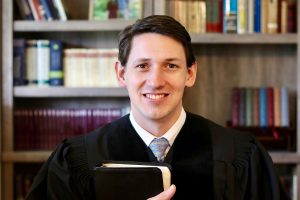 Thomas was born and raised in Australia in a family of eight. After High School, Thomas took up carpentry as a trade completing an apprenticeship and further studies in building and construction. When Thomas was in elementary school he heard the gospel and realized that no amount of good he could do could make up for the bad he has done. He was a sinner in need of a savior. He became a Christian and that changed his life forever. He served the church in a variety of positions.
Thomas was born and raised in Australia in a family of eight. After High School, Thomas took up carpentry as a trade completing an apprenticeship and further studies in building and construction. When Thomas was in elementary school he heard the gospel and realized that no amount of good he could do could make up for the bad he has done. He was a sinner in need of a savior. He became a Christian and that changed his life forever. He served the church in a variety of positions.
Thomas moved to America in 2014 with his then fiancé and now wife Sarah and they have two children Stella (4) and Calvin (1). Thomas completed an M.Div at Reformed Theological Seminary (2018) in Charlotte NC. Thomas will be ordained into the Presbyterian Church in America in 2020, due to COVID-19 precautions.




